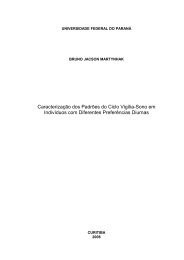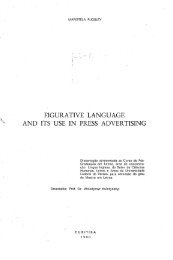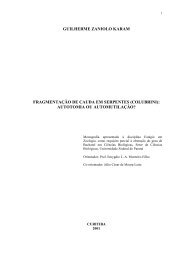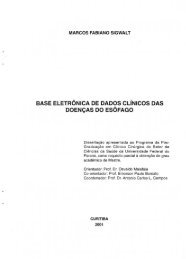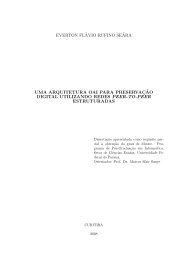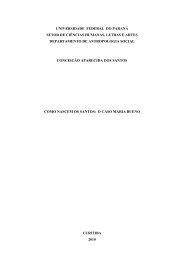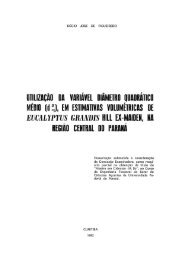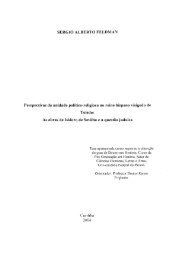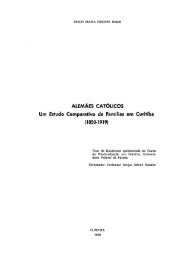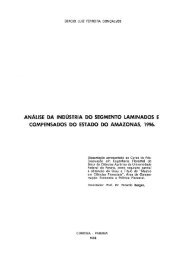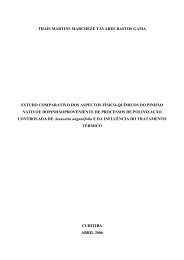- Page 1 and 2: VÂNIA DE BRITO SANGUINETTI FERREIR
- Page 3 and 4: ACKNOWLEGMENTS . / It is a pleasure
- Page 5 and 6: LIST or TABLES Table Page 1 Omissio
- Page 7 and 8: RESUMO Esta dissertação tem como
- Page 9 and 10: INTRODUCTION Since 1970 the Federal
- Page 11: oth groups was 60; these 60 student
- Page 15 and 16: CHAPTER 1 SYSTEMIC ANALYSIS OF ENGL
- Page 17 and 18: a system in the study of ngps. Sinc
- Page 19 and 20: 11 called a qualifier (q). 11 Moreo
- Page 21 and 22: . 13 We have concentrated our work
- Page 23 and 24: 1 5 'moderately', 'really', 'quite'
- Page 25 and 26: 17 be submodified by adverbs or sub
- Page 27 and 28: 19 nominal group in Portuguese; 'fo
- Page 29 and 30: 21 THE THIN, FLEXIBLE 'o magro, fle
- Page 31 and 32: 23 and abstraction that would be ca
- Page 33 and 34: 25 they usually precede the noun. T
- Page 35 and 36: 27 30 lbid. p.170. SJ Ibid. p.173.
- Page 37 and 38: 29 choice. The preparation of our s
- Page 39 and 40: 31 in the text does not fit with wh
- Page 41 and 42: 33 CHAPTER 3 READING COMPREHENSION
- Page 43 and 44: "reading comprehension is not merel
- Page 45 and 46: 37 forms of the message may be a re
- Page 47 and 48: 39 "it is the circumstances (learne
- Page 49 and 50: 41 highest level non-reciproca1 ski
- Page 51 and 52: 43 Assuming that our students have
- Page 53 and 54: 45 "extends beyond the level of sou
- Page 55 and 56: 47 - similar task". 40 This transfe
- Page 57 and 58: 49 involves requests, which are not
- Page 59 and 60: 51 students' problems were involved
- Page 61 and 62: 53 the conceptual system (or cognit
- Page 63 and 64:
55 4S Ibid. p.126. We want to make
- Page 65 and 66:
57 ability." 2 Subjective tests, on
- Page 67 and 68:
59 identification of the structural
- Page 69 and 70:
61 Introducción a la traductologia
- Page 71 and 72:
63 The results have shown that some
- Page 73 and 74:
65 opportunity to infer the correct
- Page 75 and 76:
67 The number of students enrolled
- Page 77 and 78:
69 long passages, exploitation of d
- Page 79 and 80:
4. CONCRETE 5. CAN LIFE EXIST ON TH
- Page 81 and 82:
73 r — 1 3. TISSUE INJURY transla
- Page 83 and 84:
75 (headword plus qualifier). Thus,
- Page 85 and 86:
77 be seen as a transitory stage be
- Page 87 and 88:
79 c. FEW .MOVING PARTS m m " h m h
- Page 89 and 90:
81 structural elements in his Portu
- Page 91 and 92:
83 e. uma da s ma is útil e modern
- Page 93 and 94:
85 which has, in turn, been transla
- Page 95 and 96:
87 counting up of ngps contained in
- Page 97 and 98:
89 The ngps which have caused wbt a
- Page 99 and 100:
91 the exponents of (m) and h. 5.6.
- Page 101 and 102:
Table 2 shows the number of non-spe
- Page 103 and 104:
95 Table 3 Error rate per student,i
- Page 105 and 106:
97 Table .4 .shows that the twenty-
- Page 107 and 108:
Table 5 " Wbt and i rg errors, numb
- Page 109 and 110:
Table 6 Wbt and i rg errors, number
- Page 111 and 112:
103 In Table 7 we see that wbt arid
- Page 113 and 114:
105 no wbt error was found in the o
- Page 115 and 116:
107 were linked to the academic fie
- Page 117 and 118:
109 ^CATFORD, p.78-9. y d, o, e, an
- Page 119 and 120:
in is 'an electrode which is made o
- Page 121 and 122:
113 CONCLUSION The numbèr and the
- Page 123 and 124:
115 TISSUE INJURY (T6N) tecido ofen
- Page 125 and 126:
117 ( progress in their ability to
- Page 127 and 128:
i 119 RECOMMENDATIONS Some points n
- Page 129 and 130:
121 approach to reading." 4 And as
- Page 131 and 132:
123 t only, and gradually add a num
- Page 133 and 134:
125 < REFERENCES 01. AARTS, F.G.A.M
- Page 135 and 136:
127 29. & DAVIES, E Hughes. Further
- Page 137 and 138:
1 29 a consideration of two approac
- Page 139 and 140:
APPENDIX 1 1. TEXTS 1.1. Non - spec
- Page 141 and 142:
few genes, if any, are confined in
- Page 143 and 144:
purposes it is ideal. The electric
- Page 145 and 146:
Newsprint is used in the production
- Page 147 and 148:
.one time widely accepted view that
- Page 149 and 150:
eing that 'quantum' is a more, incl
- Page 151 and 152:
enters the water, and makes the riv
- Page 153 and 154:
ions produced in a volume of gas. S
- Page 155 and 156:
very closely packed together iri th
- Page 157 and 158:
all the way to the left colic flexu
- Page 159 and 160:
T5N " - Text number'5 - Nursing CYS
- Page 161 and 162:
fatigue, malnutrition, rickets. It
- Page 163 and 164:
is that of bacterial origin, common
- Page 165 and 166:
T14N - Text number 14 - Nursing CAL
- Page 167 and 168:
17. as necessidades do pais em dese
- Page 169 and 170:
THE COUNTRY'S UNIVERSITIES 58. univ
- Page 171 and 172:
... HEAD SHAPE 9. cabeça moldada (
- Page 173 and 174:
t 47. a altura, forma magra (2) LAR
- Page 175 and 176:
EVERYDAY THINGS 15. todo dia coisas
- Page 177 and 178:
45. a apresentação gradual da jun
- Page 179 and 180:
RELATIVE CHEAPNESS 82. relativa vul
- Page 181 and 182:
117. o aço (em posição de) refor
- Page 183 and 184:
159. o requisito de condições (7
- Page 185 and 186:
oportunidade da ocasião o curso do
- Page 187 and 188:
T8P - Text number 8 - THE QUANTUM T
- Page 189 and 190:
273. Planck's (e a entrada) constan
- Page 191 and 192:
alternando periodos (1) THE NEXT IN
- Page 193 and 194:
10. 11. do mundo das células d (2
- Page 195 and 196:
51. um resultado, diminuição (2)
- Page 197 and 198:
THE LEFT COLIC FLEXURE 93. flexura
- Page 199 and 200:
THE LEFT HALF (OF THE COLON) 139. a
- Page 201 and 202:
181. uma integrado feedback, contro
- Page 203 and 204:
um doente de uretra doença uretra
- Page 205 and 206:
265. tecido ofendido (3) 266. tecid
- Page 207 and 208:
309. o maior órgão de sensação
- Page 209 and 210:
piogenica ou virus infeccioso virus
- Page 211 and 212:
389 . (dois) sistemas (de rejeiçã
- Page 213 and 214:
uma causa lenta T10N - Text number
- Page 215 and 216:
CO •=1- desfavorável uterino C)
- Page 217 and 218:
514. vegetais em forma de gases (.2
- Page 219 and 220:
THE CHANGING NEEDS 8. as mudanças
- Page 221 and 222:
ADMINISTRATIVE ACTIVITIES 34. admin
- Page 223 and 224:
60. intervenção semítica de povo
- Page 225 and 226:
4. negroide raças SICKLE-CELL ANEM
- Page 227 and 228:
TEACHING LAW 1. o ensino de leis (4
- Page 229 and 230:
1. as mais útil moderna invençõe
- Page 231 and 232:
EXPOSED METALS 23. exposição de m
- Page 233 and 234:
INADEQUATE INSERTION OF RANKSHIFTED
- Page 235 and 236:
THE NORMAL EVENT 74. o normal event
- Page 237 and 238:
100. vi b ra ção propri edade (1)
- Page 239 and 240:
EXTREMELY DELICATE METHODS 123. ext
- Page 241 and 242:
21. um resultado em gotas (10) 22.
- Page 243 and 244:
45. o paciente com necessidade (2)
- Page 245 and 246:
locutor renal danificado SUBSEQUENT
- Page 247 and 248:
INADEQUATE INSERTION OF RANKSHIFTED
- Page 249 and 250:
Std %_ cidades universitarias 3 4,8
- Page 251 and 252:
THE 'NOBLE' METALS Std o nobre meta
- Page 253 and 254:
HEAD SHAPE - Std cabeça moldada 2
- Page 255:
ASCENDING INFECTION refluxo infecta
- Page 258 and 259:
metal reforços STRETCHED STEEL WIR
- Page 262 and 263:
Std % foice-celula de anemia 1 1,61
- Page 264 and 265:
STRUCTURAL STEEL Std % estrutura de
- Page 266 and 267:
THE THIN, FLEXIBLE DRUM a delgada f
- Page 268 and 269:
CHRONIC PULMONARY OR CARDIAC DISEAS
- Page 270 and 271:
ELECTRIC SUPPLY LINE Std eletricida
- Page 272 and 273:
NORMAL BLADDER EMPTYING Std % norma
- Page 274 and 275:
List XIV Singular for plural with t
- Page 276 and 277:
z = (126 - g, 5) - no = 15,50 ] 8Q
- Page 280 and 281:
the ngps e= 12.02 : V H^0- 2 „ 12
- Page 282 and 283:
SERVIÇO PÜBÜCO FEDERAL UNIVERSID



